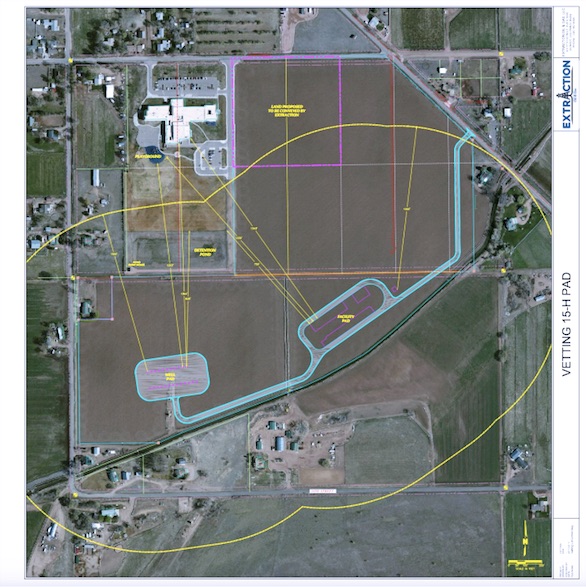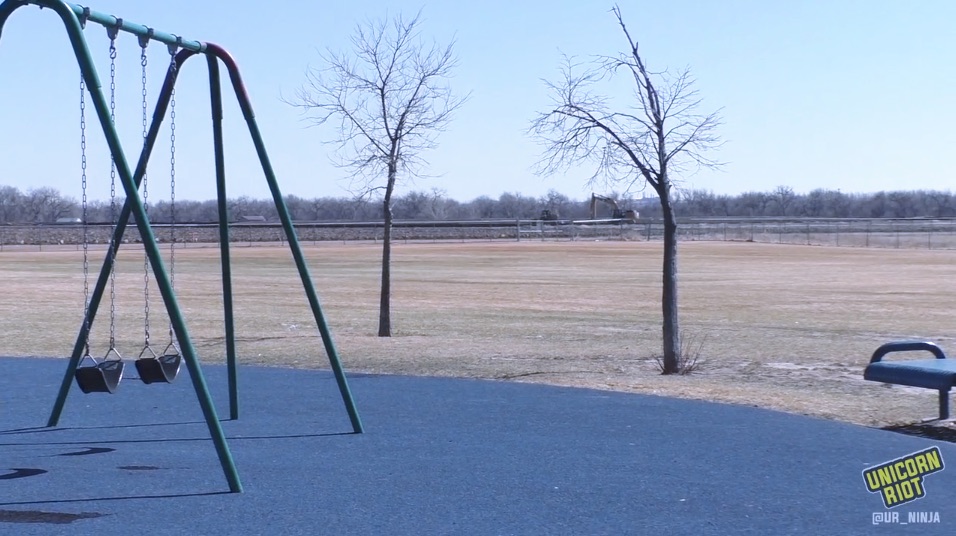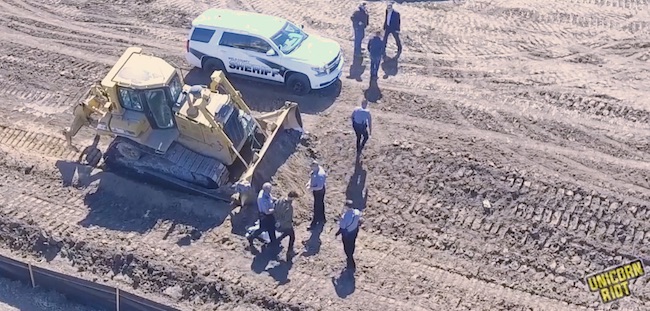Oil & Gas Corporation Sues Colorado Anti-Fracking Activists
Weld County, CO – Around 6 a.m. on March 23, 2018, Cullen Lobe called his manager at the local donut shop where he works to say he was running a little late. His manager informed him that there was someone waiting there for him.
Once he got to work and walked inside, a woman walked up to Lobe, asked him to confirm his identity, then handed him a summons from Extraction Oil & Gas. Before Lobe could say anything to her, she walked out the door.
Lobe is already facing charges in Weld County of second-degree criminal trespassing and tampering with oil and gas equipment from a non-violent direct action on March 8, 2018.
Lobe’s manager told him that while he and the woman with Extraction were waiting for Lobe, she was asking what car Lobe drives, asking when he works, and asking the manager if he knew what Lobe had done.
It’s weird. It’s odd to me. I’m a simple guy. Live paycheck to paycheck. And now I’m being sued by a big corporation. They want to silence me and stop peaceful civil disobedience. They won’t silence me and they won’t stop me or anyone else.” – Cullen Lobe
Soon after Lobe was handed the summons, five other people were added to the complaint including John Lamb, a lawyer with the National Lawyers Guild who was acting as a legal observer on March 8, and Jeremy Mack, an independent journalist who was also present documenting the events.
Extraction Oil & Gas, a Denver-based energy company, which is also a Delaware Corporation, is building a fracking site with 24-well pads approximately 1,000 feet from the Bella Romero Academy school building. The school teaches grades 4-8, with a student body between the ages of 9 and 14.
Lobe explained that although the main reason he participated in the non-violent direct action was to protect the children, he also wanted to shine a light on what he sees as blatant discrimination:
The main thing about this project is it is a clear cut case of environmental racism. Bella Romero Academy is a predominantly Latino community–89%. Ninety-three percent of the students there come from low-income families, and before they put it at this site, they wanted to put it at Frontier Academy in Greeley, which is a predominantly upper class and white school. The parents didn’t like that, so they put it here at Bella.”
In the official complaint filed on March 9, 2018, Extraction’s attorneys from the law firm Polsinelli PC wrote that in the preliminary stages of the lawsuit, the plaintiffs (Extraction) will not engage in a debate over whether the non-violent direct action by defendants (Lobe and others) was in the public’s best interest.
The plaintiffs do, however,
appreciate that Defendants style themselves as protesters engaging in civil disobedience to oppose oil and gas development projects, and Defendants will argue that the public interest is served by shutting down the project on Plaintiffs’ Property.”
Polsinelli not only protects the interests of oil and gas corporations, it also works closely with the Denver Downtown Partnership, a business organization which successfully lobbied for the passage of the Unauthorized Camping Ordinance in 2012 to effectively criminalize people without housing.
Amy Hansen, a shareholder at Polsinelli, is a Partnership board member, as well as, the chair of the Housing Taskforce for the Partnership. Polsinelli is also the premier sponsor for this year’s Annual Downtown Denver Awards Dinner hosted annually by the Partnership.
According to the complaint written by Polsinelli, the law firm and Extraction believe
it is enough to note that Extraction is operating in full compliance with Colorado law, and pursuant to permits issued by state and local officials including (but not limited to) the Weld County government and the Colorado Oil and Gas Conservation Commission.”
Although it is correct that Extraction is in accordance with Colorado law, community members don’t agree with Extraction that abiding by the laws ensures public safety.
As of August 1, 2013, in Colorado, there is a 1,000 foot setback from high occupancy buildings such as schools or hospitals for active oil and gas sites. The setback from houses is 500 feet, and the setback from outdoor recreational areas such as playgrounds or sports fields is 350 feet. These setback regulations do not prohibit active sites from being on school property.
In fact in March 2017, HB17-1256 was introduced into the Colorado Legislature to clarify that the setback of 1,000 feet would be from the school property line, however, the bill was killed in the Senate Agriculture, Natural Resources, and Energy Committee.
Megan Meyer, a Greeley resident and community organizer, believes the school children at Bella Romero will be at risk when the site is active:
These kids come out here and they play on these ball fields, so while Extraction is within their legal rights to drill over here because they are over 1,200 feet from the school building, the bricks are protected, but the children are not when they are outside.”

A local environmental-justice organization, Colorado Rising, is trying for the second time (the first time was fall 2016) to get an initiative on the ballot to create a 2,500 foot setback from any occupied buildings or “vulnerable areas.”
The ballot initiative faced opposition from the Colorado Alliance of Mineral Royalty Owners (CAMRO), as it did initially in 2016. In February 2018, CAMRO appealed the Secretary of State Title Board’s approval of the initiative, and the case was heard in the Colorado Supreme Court. On Wednesday, April 11, the court cleared the initiative and sided with Colorado Rising.
Simultaneously, CO SB192 called “Local Government Liable Fracking Ban Oil And Gas Moratorium” has passed the CO Senate, and was introduced into the House State, Veterans, & Military Affairs Committee on April 4, 2018. This bill would require “that a local government that interferes with oil and gas operations compensate persons damaged by the interference.” (In the bill’s summary, “persons” means oil and gas corporations.)
The surge in large frack pads being built near Colorado elementary schools is the main reason for the initiative. In the Lafayette-Erie area of CO, Extraction is trying to obtain a permit under its subsidiary 8 North for a state drilling and spacing order on a 1,280-acre area between Arapahoe and Baseline roads. This expansive well site would be at the southwest corner of the Escuela Bilingue Pioneer Elementary property.
At both Bella Romero and Escuela Bilingue, students, parents, teachers and staff have been involved in rallies and other types of protest in opposition to the fracking wells.

The Greeley-Evans School District 6 Board of Education passed a resolution on January 8, 2018 opposing new oil and gas well sites closer than 2,000 feet to its schools. The resolution has no power of enforcement, but it sends a clear message of disapproval to Extraction.
In April 2017 the Sierra Club and a coalition of civil rights and community groups, represented by the Denver University Environmental Law Clinic, filed a lawsuit alleging the Colorado Oil and Gas Conservation Commission (COGCC) unlawfully approved the Extraction fracking project near Bella Romero.
The lawsuit cites a ruling in March 2017 by a Colorado Court of Appeals, which ruled that the state can no longer put the interests of oil and gas companies above those of communities and the environment. The lawsuit alleges that the COGCC did not adequately assess the alternatives or the risks to community members, and that issuing these permits violates the agency’s duty to protect public health and the environment.

In a 2012 study done by researchers from the Colorado School of Public Health, a number of toxic petroleum hydrocarbons were found in the air near fracking wells including benzene, ethylbenzene, toluene and xylene. Benzene has been identified by the Environmental Protection Agency (EPA) as a known carcinogen.
Chronic (long-term) inhalation exposure has caused various disorders in the blood, including reduced numbers of red blood cells and aplastic anemia, in occupational settings. Reproductive effects have been reported for women exposed by inhalation to high levels, and adverse effects on the developing fetus have been observed in animal tests. Increased incidence of leukemia (cancer of the tissues that form white blood cells) have been observed in humans occupationally exposed to benzene.” – EPA Benzene Fact Sheet (PDF)
Another study co-authored by economists from Princeton University, the University of Chicago and UCLA, found that pregnant mothers who live near shale oil and gas fracking face an elevated risk of giving birth to babies with health problems.
The study looked at more than 1.1 million births between 2004 and 2013 in Pennsylvania, a major producer of natural gas from shale deposits. According to the research, babies born to mothers who live about half a mile from fracking sites are 25 percent more likely to be born at low birth weights. Infants born below 5.5 pounds are at greater risk of infant mortality, attention deficit hyperactivity disorder, and asthma.
Megan Meyer sees a direct connection to Greeley, CO:
There hasn’t been enough research or studies done to prove causation, but there is correlation, between the oil and gas boom in Weld County and child infant mortality rates. Our child infant mortality rates are higher than in neighboring counties, and while they’ve gone down some in the last few years thanks to interventions from the health department, the biggest cause of infant mortality in Weld County is connected to low birth weights and premature births.”
The correlation may seem strong enough to prove a weighty risk in Meyer’s eyes, but even with peer-reviewed in-depth studies, Extraction is still permitted to construct their fracking site next to Bella Romero.
On Wednesday, April 11, Jason Flores-Williams, counsel for Cullen Lobe, filed a Motion to Dismiss Extraction’s lawsuit on grounds that it violates the First Amendment.
The introduction to the motion reads,
From monitoring protest organizers to enabling state senators to skew public discourse, Extraction has exhibited a pattern of disregard for the core values of expression, association and redress. . .
Extraction is not only suing citizens who engage in peaceful protest—six and counting—but will use discovery to obtain the names and identities of everyone who has rightfully
criticized the massive fracking operation at Bella Romero public school.”
Flores-Williams told Unicorn Riot that
the lawsuit is trying to find out who is associated with who and trying to repress free speech.”
As this legal fight with Extraction continues, Lobe still faces two charges from Weld County. His court date is on May 8, 2018.
It’s bigger than just me. It seems like they’re using me as a guinea pig. But they’re fighting whole communities.” – Cullen Lobe
Unicorn Riot will continue to provide coverage when updates are available.
To help our volunteer operated, horizontally organized, non-profit media collective please consider a tax-deductible donation:



